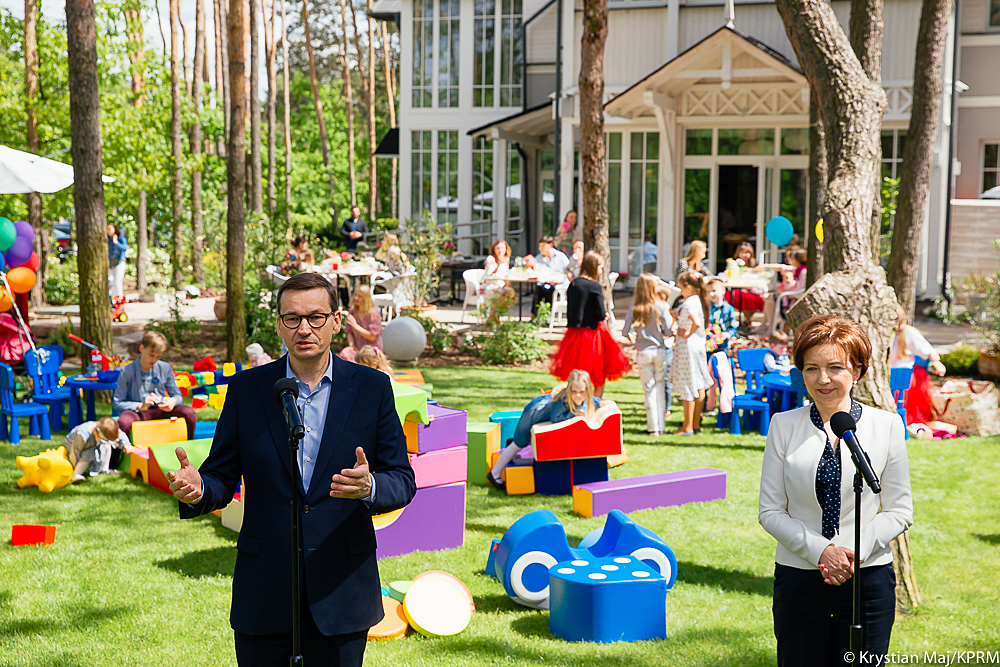The Polish government has unveiled a new demographic strategy in its latest bid to boost the country’s birth rate and strengthen families. The programme aims to protect new parents in the workplace as well as to provide them with housing, care and financial incentives.
Poland, with one of the lowest fertility rates in the European Union, has a shrinking and ageing society. Statistics Poland (GUS), the government’s statistical agency, estimates that the population will fall below 34 million (from almost 38 million at present) by 2050.
Various “pro-family” policies launched in recent years, notably the flagship “Family 500+” child benefit scheme, have failed to increase the number of births, as the government admitted last year.
But it hopes that its latest “Demographic Strategy 2040” programme will “strengthen Poland”, said the prime minister, Mateusz Morawiecki, quoted by Interia. “The family is a microcosmos, a small society. How children are raised in a family later affects the future of society”.
The strategy’s three central objectives are “strengthening the family”, “removing barriers for parents wanting to have children”, and streamlining policies at central and local level.
Specific aims for the programme, which will now enter a public consultation stage, include guarantees of flexible work for pregnant women and parents of children aged up to four. They are also to be assured reduced hours, with employers legally prohibited from discriminating against them as a result.
Mothers returning from maternity or parental leave are also to be protected from being made redundant for 12 months. It will also not be permitted to dismiss fathers until their child’s first birthday, and also during pregnancy if the parents are married.
The government also says that it will set up a “model procreative health centre”, offering comprehensive, specialist care.
Marlena Maląg, the family and social policy minister, said that housing, fiscal policy, stable employment and care for young children were the main challenges faced by Polish families. She promised “specific actions”, including increased housing support for larger families, reports Onet.
Maląg also noted that legislation is being prepared for a new instrument, “parental care capital” of 12,000 zloty (€2,640), which parents will be entitled to collect for second and further children between the age of 12 and 36 months.
Morawiecki said that the ruling Law and Justice (PiS) party has support for Polish families “in its genetic code” and had been boosting them in all areas since it came to power in 2015, but insisted that “we still want more”.
“In the family we learn to differentiate good from evil, we learn responsibility, patience,” he said, quoted by Interia. “So the more happy Polish families, the more happy Poland will be in future.”
“We do not want to be, as Pope Francis said, an infertile Europe. We want Poland, followed by Europe, to strengthen itself also demographically, and for this to happen by supporting families,” the prime minister added.
Deputy minister Barbara Socha noted that Poles did not need to be convinced to have children. “According to some studies, even 98% of Poles say that they want to have children, and almost 40% that it would be best if it was three or more children,” she said, quoted by Interia.
She added that the demographic strategy would allow the objective of raising fertility to a level permitting the population replacement level to be reached within 20 years. This level requires a fertility rate of 2.1 births per woman, reports Onet.
The latest data from Eurostat show that the figure in Poland has dropped to 1.44, a problem exacerbated by the high excess death rate recorded last year.
Main image credit: Krystian Maj/KPRM (under CC BY-NC-ND 2.0)

Ben Koschalka is a translator, lecturer, and senior editor at Notes from Poland. Originally from Britain, he has lived in Kraków since 2005.




















